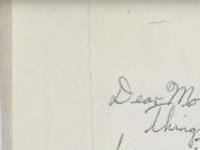In this lesson, students will read letters written by two Vietnam soldiers from Pennsylvania. PFC Edward Woods Jr. was a Marine from Upper Darby and Louis Piatetsky was Navy Medic. These letters give an honest portrayal of a soldier's life in Vietnam and contain some graphic details.
The views represented in these letters do not represent the views of HSP. After reading these letters, students will better understand what it was like to serve in the Vietnam War and empathize with these soldiers who were fighting far away from their families.


